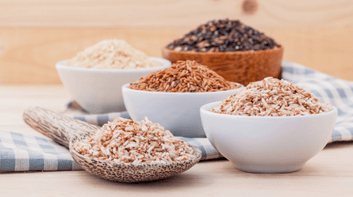
Love your bread, rice and pasta?! Feels like it’s a ‘forbidden love’ these days? While there’s diet advice for every age, for those in their 40s, you will probably have heard, “don’t eat carbs” quite often. As you grow older and your body’s hormone levels change … so does its relationship with food. Many people start struggling with their weight and other health concerns in their 40s. At this time, your metabolism (how quickly you process your food into energy) starts changing, and so do your nutritional needs – i.e. what & how much you should eat and drink.
How perimenopause affects your weight
A combination of factors – decreasing hormone levels, changes in your lifestyle habits, reduced metabolism, certain medical conditions – can make it difficult for you to maintain your weight in your 40s. You are also more likely to gain belly fat – which is quite dangerous for your health. Women also start losing muscle mass around this age, which makes losing weight even more difficult. So, perimenopause is a great time to reconsider your diet. Your diet, including recommended carb intake, must be tailored to your needs. In this blog, we share some tips on healthier carbs you can substitute in your favourite meals.
Is eating carbs bad for you?
Carbs get a bad reputation, which is not entirely deserved. Not just a delicious foundation of a hearty meal, carbs are an essential source of energy and an important part of a healthy diet. But as your metabolism slows, and your life gets busier, but also more comfortable – you’re eating well, but exercising less – you are not using up the energy from all the carbs you eat. All this excess gets stored as fat, and starts becoming a problem. But not carbs are bad. Simple, refined carbs that have gone through multiple rounds of processing – like white bread, white rice, white pasta, cereals, pastries – these are the problem. Whole grains and other complex carbs are actually quite good for you.
Is it possible to eat less carbs?
It would be a miserable life if you could never have pasta or some cake, right? So don’t even think about quitting all carbs! Also, it doesn’t work. Carb cravings are very real, and as your blood sugar drops you are more likely to make bad decisions (like reaching for a muffin, when you could have had oatmeal!); you are just setting yourself up for failure. Instead work on ways that you can reduce your carb intake without starving or depriving yourself. Like fill 3/4th of your plate with proteins and vegetables – so you feel full even with a smaller amount of pasta/rice. Similarly, load up your vegetable curries, so you can eat more of that instead of the rice.
Eat more of the “good carbs”.
What is a good carb? Good carbs are complex carbohydrates packed with nutrients and fibres that take longer to digest. So, they increase your blood sugar slowly, instead of causing sugar spikes and crashes like refined carbs. Increase your intake of good carbs like starchy vegetables (potatoes, sweet potatoes, peas, corn), legumes (beans, lentils), and whole grains. Instead of overly processed bread for breakfast, try having oatmeal. Switch to brown rice, a more nutrient-dense alternative to white rice.
Try some healthy low-carb substitutes
You can occasionally swap out white rice from your meal with lower carb options as a base for your favourite dals and curries. Quinoa is a protein-rich food that makes a great substitute for rice. It does not have a strong flavour, and tastes just as good tossed in a salad or as fried “rice” with veggies. You can also try cauliflower rice – a healthy, low-carb substitute that goes really well with a side of stir-fried vegetables or any Indian curry. These low-carb substitutes still help you feel full without spiking your blood sugar.
